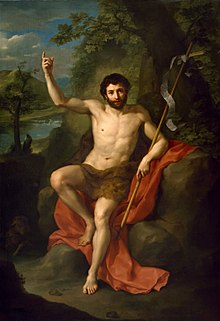Yahya ibn Zakariyya
| John the Baptist | |
|---|---|

John the Baptist Preaching in the Wilderness by Anton Raphael Mengs, 1760
|
|
| Prophet | |
| Born | Late 1st century BC Herodian Judea, the Levant |
| Died | AD 31 – 32 Machaerus, Perea, the Levant |
| Venerated in |
Christianity Islam Bahá'í Faith Mandaeism |
| Canonized | Pre-Congregation |
| Major shrine |
|
| Feast | June 24 (Nativity), August 29 (Beheading), January 7 (Synaxis, Eastern Orthodox), Thout 2 (Coptic Orthodox Church) |
| Attributes | Camel-skin robe, cross, lamb, scroll with words "Ecce Agnus Dei", platter with own head, pouring water from hands or scallop shell |
| Patronage | see #Commemoration |
John the Baptist (Ancient Greek: Ἰωάννης ὁ βαπτιστής, Ioánnes (h)o baptistés or Ἰωάννης ὁ βαπτίζων, Ioánnes (h)o baptízon,Arabic: يحيى, translit. Yaḥyā) known as the prophet Yahya in the Quran, as well as John the Baptizer, was a Jewish itinerant preacher in the early first century AD. John is revered as a major religious figure in Christianity, Islam, the Bahá'í Faith, and Mandaeism. He is called a prophet by all of these traditions, and is honoured as a saint in many Christian traditions.
John used baptism as the central symbol or sacrament of his messianic movement. Most scholars agree that John baptized Jesus. Some scholars believe Jesus was a follower or disciple of John. This idea is strongly controverted, however, by John the Baptist's own words in scripture, although several New Testament accounts report that some of Jesus' early followers had previously been followers of John. John the Baptist is also mentioned by the Jewish historian Josephus. Some scholars maintain that John was influenced by the semi-ascetic Essenes, who expected an apocalypse and practiced rituals corresponding strongly with baptism, although no direct evidence substantiates this.
...
Wikipedia
